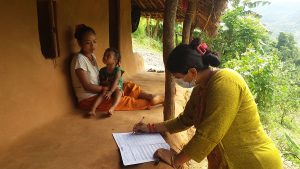There is an ancient folk tale in Kinanti wisdom that talks about one of the qualities of the bat as a little feathered creature in the universe. The bat was once able to deceive the Sun, the god of light, and able to rescue humankind from the darkness. Consequently, this small bird does not fall off, but it holds on its support. Bat is also identified as the only bird that uses its mouth to both eat and to defecate. This suggests a typical formation if it carried the novel coronavirus to humans as it is claimed by wise explorers of modern medical science.
From the folk story, one can draw that it is going to stay as long as we human beings are not able to fight against it with our fortified internal immune system. And, to fight whether to a visible or an invisible enemy, one requires a particular set of mind – thoughts, strategy, a plan of action, the conviction and finally actions in the field. Of course, to guarantee the implementation of a well-thought-out plan on the ground, a wise architecture is needed. Various types of carefully selected actors will have to lead the battleground. At least, in Nepal, it is clear that all of these prerequisites seem to coexist, but in a bizarre fusion.

Since the WHO’s warnings in the early March 2020 about how fatal the spread of the virus is, the consequences and the found wisdom to neutralise the spread of infection and to defuse a possible public health disaster, Nepal has done nothing but to create a fear of death in the psyche of the people around the globe. A death that can come without allowing any breathing space to feel a sense of fulfilment in life, a path that knowingly or unknowingly human beings adhere to live in this world… Of course, the nuances to handle the deadly coronavirus have drawn upon the philosophy of medical science and suggest wellbeing of an individual within a prescribed hospitalisation framework of the colonial west. The reality is that until now this prescription has not given us a reasonable way out. Moreover, in Nepal, rather than allowing medical interventions to trap the virus, politics has been turned as an instrument to produce rent-seeking behaviours on behalf of the governing elites than to limit the disease’s fatal impact on the population.
Lethal attacks of any virus on human existence are not a new phenomenon in human history. Notwithstanding their cause, accidental death is a reality, be it the great plague of the 19th century or the 2015 earthquake and recent landslides and floods. This has all taught us in a different way. Fear is inevitable; any death breaks relationships in a way that necessitates a reconstruction of lives and a change in the everyday understandings that guide interaction. In recent days, the unwanted Covid-19 fear has framed a meaning of death from different perspectives.

It appears as if death is forbidden in modern society and has its limitations to a bureaucratic process. Fear is obvious. More so as we have not been able to initiate ourselves into a practice that could lead to experience the comforting sense of immortality/mortality. In fact, this is taxing us too much as an individual, family and as a society altogether.
Dan Pagis, an Israeli poet in his poem ‘The Dance of Death’, has rightly pointed out:
“During the plague I came into my own.
It was the time of smoke-pots in the house
Against infection. The blind head of bone
Grinned its abuse.
Like a good democrat at every one.
Runes recited daily, charms were applied.
That was the time I came into my own.
Half Europe died….”
In the past, our ancestors have coped with various types of pandemics that at times had threatened the very existence of human civilisation. They had handled the crisis whether with wisdom and knowledge or with the common sense that they could collect at the time of a crisis to cope and succeed. People have learned to restrain themselves from an exposure to such spread of the virus that would probably have its seeds in the environment and in the very air that we breathe to exist. But at this time, we have dramatically failed to explain and to make people understand, or for that matter to recollect our own wisdom to handle this coronavirus. More than drawing upon our own internal sense of being to cope with an external exposure, we have given in totally to the medicalisation approach to handle it, of which at least, it appears, in Nepal, we do not have any grip.

Our education system that produces medical personnel is ethically challenged. The mechanisms to have access to healthcare and its crippled infrastructure are all known to the naïve population of this country. In the majority of institutions, self-interest prevails over medical care and support, except a few exceptions. On the top, as a population, we are grappling with a sense of a messiah syndrome not just only to lead a way to handle the present Covid-19 crisis but in all most every other affair of our public life. To ensure a safe passage from the pandemic, we are left with a prime minister and his council of ministers who have years of political learning and skills but are overburdened with perpetuated politicking of foul play. In reality, we are asking too much of him, a person who is struggling himself to contain his own life energy to function.
A way out seems only possible if we see this pandemic beyond its abnormality. We can draw upon our traditional wisdom to prevent exposure to the virus in the first place, and if it is all transmitted, explore ancient herbal means to neutralise it. Make use of medical technology if required including testing and professionally supervised medical infrastructures.
Stop making a hue and cry over it. Rather than drawing on excluding and isolating ourselves, a measure to break the cycle of spread, but not to eradicate or cure, let us fight it with coordinated efforts than harsh policing.
Let people breath peace,
Be happy you the infected who are being cared for,
And professionals who care for them,
Be happy, O humans, die a death as normal as life if it comes, in hospital beds or in homes.
Be happy all of you there.

























